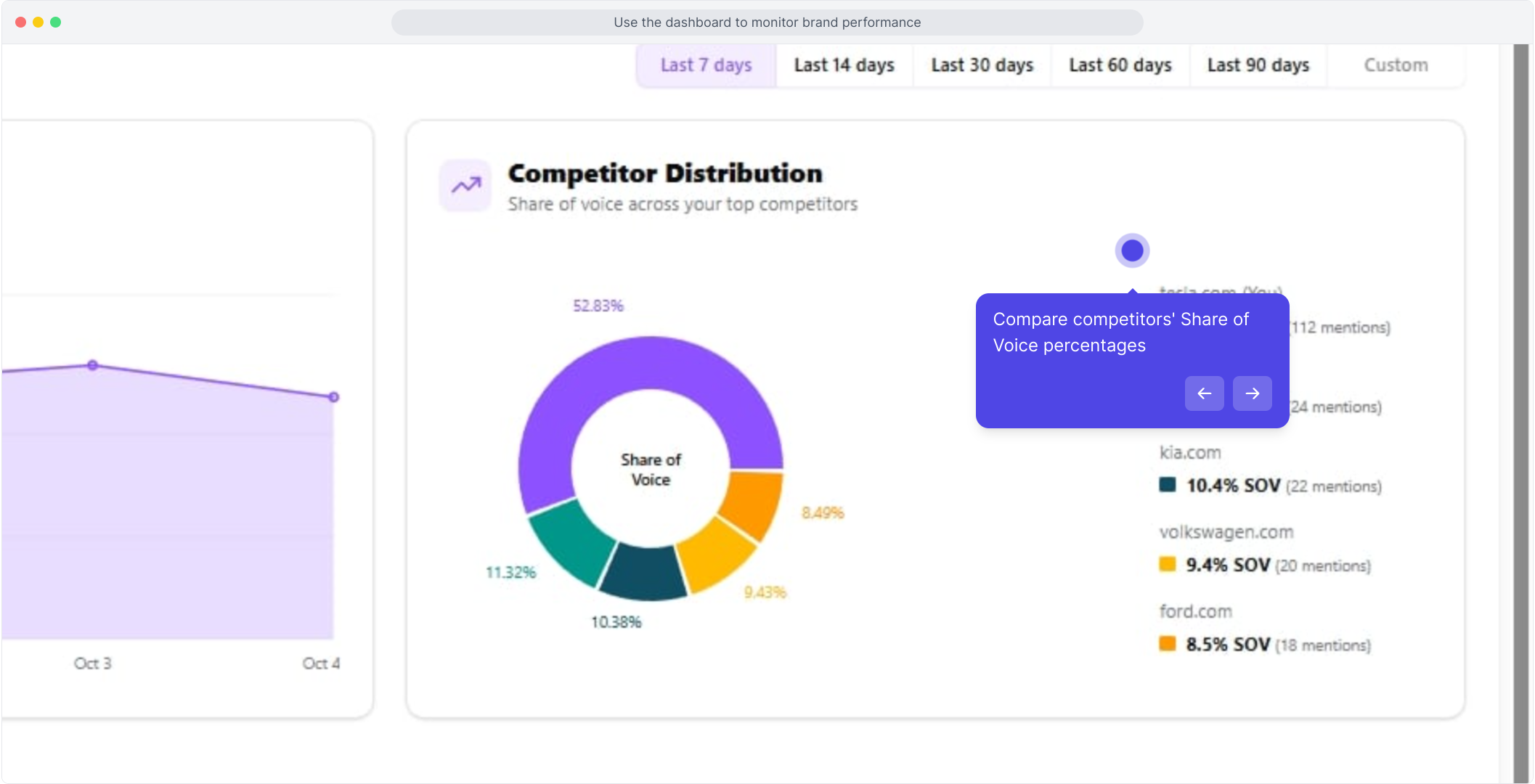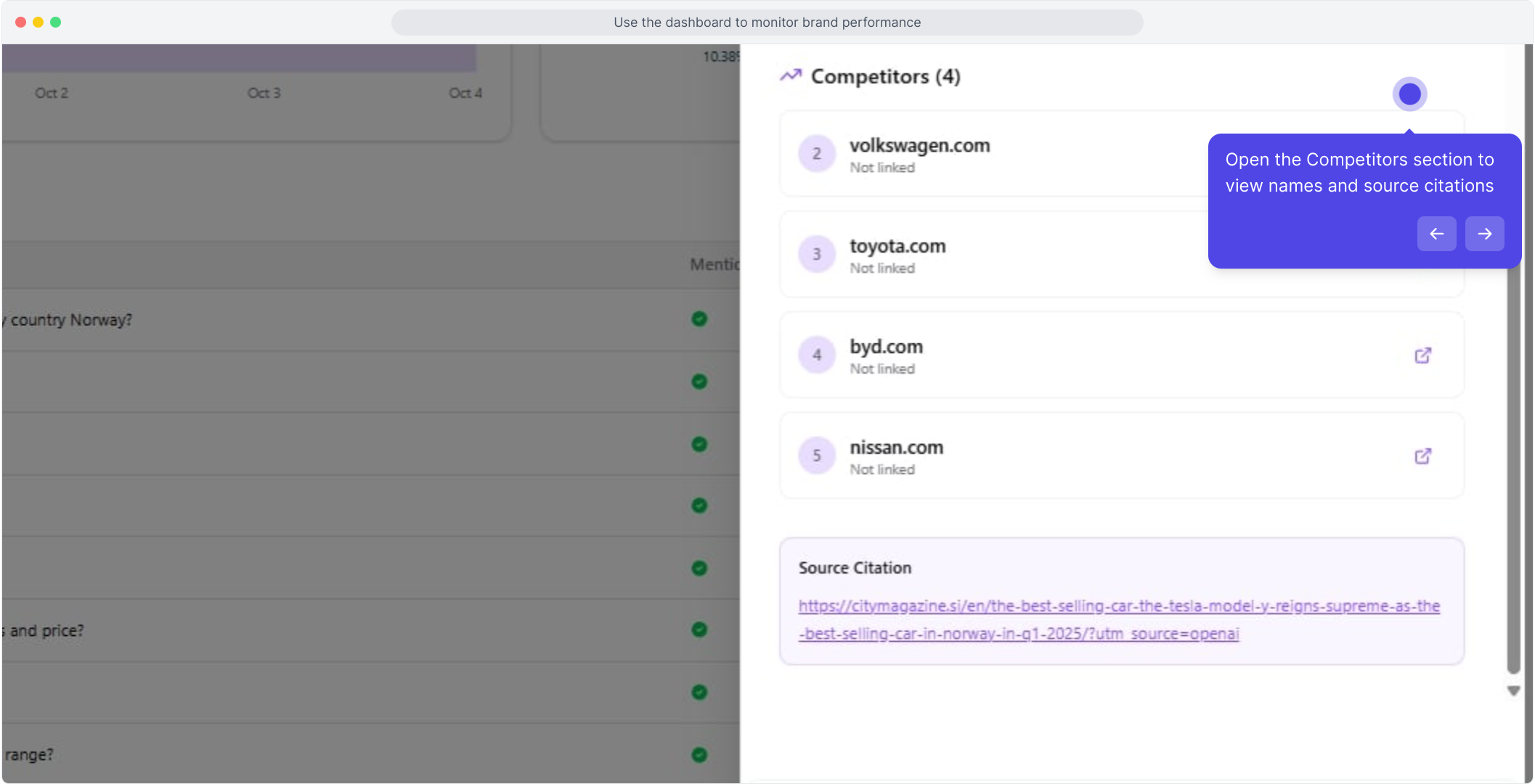Competitor Tracking
Understanding your competitive landscape in AI search is crucial. RankSmith’s competitor tracking features help you see exactly how your brand compares to competitors across all major AI platforms.
Why Track Competitors in AI Search?
AI search engines don’t just return a list of links - they synthesize information and directly recommend brands. Understanding who gets mentioned instead of (or alongside) you is critical for:Identify Gaps
Discover queries where competitors appear but you don’t
Benchmark Performance
Compare your Authority Index™ and metrics against competitors
Learn Strategies
See what content and sources help competitors rank higher
Track Share of Voice
Monitor your market share in AI-generated responses
Setting Up Competitor Tracking
1
Add Competitors
Navigate to Settings > Competitors and add the brands you want to track
2
Select Relevant Prompts
Choose prompts where competitive comparison is most valuable
3
Monitor Daily
RankSmith tracks competitor mentions across all your prompts automatically
4
Analyze Results
Compare metrics, mentions, and source citations on your dashboard
Competitor Metrics Explained
Share of Voice
Definition: The percentage of AI responses that mention each brand when answering your tracked prompts. Example: If 50 prompts are tracked and your brand appears in 25, while Competitor A appears in 30, your Share of Voice is 50% vs. their 60%. How to improve: Create content addressing topics where competitors dominate but you’re missing.
How to improve: Create content addressing topics where competitors dominate but you’re missing.
Relative Ranking
When both you and a competitor are mentioned in the same response:- Rank 1-3: Premium positioning - first mentioned
- Rank 4-7: Mid-tier visibility
- Rank 8+: Lower visibility, mentioned late
Being mentioned earlier in an AI response often indicates stronger topical authority and better source quality.
Co-mention Analysis
See which competitors are frequently mentioned alongside your brand:- High co-mention rate: You’re competing in the same space
- Low co-mention rate: Different market positioning or gaps in your coverage
Competitive Intelligence Insights
Source Analysis
Discover which authoritative sources mention your competitors:Industry Publications
Industry Publications
Track which top-tier industry publications feature your competitors
Review Sites
Review Sites
See which review platforms AI engines trust for your industry
News Outlets
News Outlets
Monitor press coverage that boosts competitor AI visibility
Expert Content
Expert Content
Identify thought leadership that AI platforms reference
Content Gap Identification
For each prompt where a competitor appears but you don’t:- Analyze their content: What topics do they cover that you don’t?
- Check their sources: Where are they being cited?
- Identify the format: Blog posts, case studies, whitepapers?
- Note the depth: How comprehensive is their coverage?
- Create better content: Fill the gap with superior resources
Competitive Analysis Dashboard
Your competitive analysis dashboard shows:Head-to-Head
Direct comparison metrics for each competitor
Trending
Which competitors are gaining or losing AI visibility
Prompt Performance
Prompt-by-prompt breakdown of who ranks where
Source Overlap
Shared vs. unique citation sources
Sentiment
How sentiment differs between your brand and competitors
Platform Breakdown
Performance differences across AI engines
Competitive Strategy Framework
When You’re Behind
If competitors consistently outrank you:1
Content Audit
Map their content strategy - what topics do they own?
2
Authority Building
Get featured on sources AI engines trust in your industry
3
Coverage Expansion
Create comprehensive guides on topics they dominate
4
Unique Angles
Find sub-topics they haven’t covered and own those
When You’re Ahead
If you’re outperforming competitors:- Maintain momentum: Keep content fresh and updated
- Defend your position: Monitor for competitor improvements
- Expand coverage: Own adjacent topic areas
- Document wins: Track what’s working for other areas
When You’re Equal
If you and competitors trade positions:- Differentiation: Find unique positioning angles
- Quality over quantity: Make your content more comprehensive
- Fresher content: Update more frequently
- Better sources: Aim for higher-authority citations
Best Practices
Track 3-5 Main Competitors
Track 3-5 Main Competitors
Focus on direct competitors in your space, not every possible alternative
Weekly Reviews
Weekly Reviews
Check competitive metrics weekly to spot trends early
Prompt Coverage
Prompt Coverage
Ensure competitors are tracked across all relevant prompt categories
Learn and Adapt
Learn and Adapt
When competitors rank higher, analyze why and adapt your strategy
Don't Just Copy
Don't Just Copy
Learn from competitors but create unique, better content
Common Mistakes to Avoid
Don’t obsess over daily fluctuations. Focus on weekly and monthly trends when comparing to competitors.
- Tracking too many competitors (dilutes focus)
- Only tracking direct feature comparisons (miss broader topics)
- Copying competitor content (creates no differentiation)
- Ignoring smaller competitors (they might be doing something innovative)
- Not acting on insights (tracking without action is wasted effort)
Taking Action on Competitive Insights
Priority Framework
High Priority: Prompts where you rank #8+ and competitors rank #1-3- These represent your biggest gaps
- Create comprehensive content immediately
- Aim to get cited by authority sources
- Opportunity to improve positioning
- Enhance existing content or create new resources
- Focus on depth and unique angles
- Maintain current positioning
- Look for differentiation opportunities
- Monitor for changes
Reporting Competitive Performance
Share competitive insights with your team:Executive Summary
Monthly report showing Share of Voice trends and key wins/losses
Action Items
Prioritized list of prompts where you should focus content efforts
Competitive Threats
Highlight competitors gaining ground and in which areas
Success Stories
Showcase prompts where you’ve overtaken competitors
Next Steps
Dashboard Overview
Learn about all dashboard metrics
Improving Visibility
Strategies to outrank competitors
Competitor Analysis Tips
Advanced competitive intelligence techniques
Start Tracking
Begin monitoring your competitors today
The best competitive intelligence isn’t about copying - it’s about identifying gaps and creating superior content that AI engines prefer to cite.